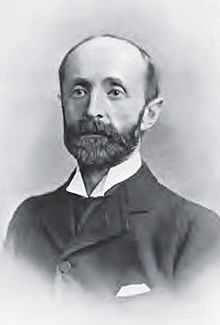Dixon Edward Hoste
| Dixon Edward Hoste |
|---|
|
Missionary to China | | Born |
23 July 1861
England |
|---|
| Died |
11 May 1946
London, England |
|---|
|
|
Dixon Edward Hoste (23 July 1861 – 11 May 1946) was a British Protestant Christian missionary to China and the longest lived of the Cambridge Seven and successor to James Hudson Taylor as General Director of the China Inland Mission, (from 1902 to 1935).
He was the son of Major General Dixon Edward Hoste (see Dixon Hoste disambiguation page). He was educated at Clifton College and the Royal Military Academy at Woolwich, and at the age of 18 was commissioned as a lieutenant in the Royal Artillery. In 1882 he experienced conversion under the influence of Dwight Lyman Moody.
In 1883 he became interested in the work of the China Inland Mission, and was the first of the Cambridge Seven to apply to work with this mission, and after some delay was accepted, sailing for China in 1885. He was sent to Küwu (presumably Quwo), to the south of Linfen in Southern Shanxi. In 1886 he was ordained as a pastor by Hudson Taylor, and moved to Hungtung (now Hongdong or Hongtong) to work with Stanley Peregrine Smith who had opened an opium refuge there at the invitation of Pastor Hsi. He worked under Xi, wore Chinese clothes, ate Chinese food, and tried to get an insight into the Chinese mind. Hoste is credited with making the Chinese churches apply the indigenous principles of self-government, self-support, and self-propagation. This threefold motto was later adopted by the Three-Self Patriotic Movement after missionaries were expelled from China.
In 1893, he married Gertrude Broomhall, daughter of CIM General Secretary Benjamin Broomhall and his wife Amelia, (Hudson Taylor's sister). Because of ill-health Mr Hoste visited England in 1896 and then spent some time in Australia before returning to China. During his appointment as General Director of the China Inland Mission he was based in Shanghai, and after internment there by the Japanese Army from 1944 to 1945, returned to England where he died in 1946 at the Mildmay Nursing Home. His wife had died in Shanghai in approximately 1943.
Works
- 36 Steps to Christian Leadership (1999)
- If I am to Lead (1968)
- The Insight of a Seer: Selections from the Writings of Hudson Taylor's Successor
- Why I Have Joined the Bible Union of China (1921)
Quote
| “ |
The man who does not learn to wait upon the Lord and have his thoughts molded by Him will never possess that steady purpose and calm trust, which is essential to the exercise of wise influence upon others, in times of crisis and difficulty. |
” |
Further reading
- Historical Bibliography of the China Inland Mission
| Religious titles |
Preceded by
Hudson Taylor |
Director of the China Inland Mission
1901–1935 |
Succeeded by
George W. Gibb |
Protestant missions to China |
|---|
| | Background | | |
|---|
| | People | |
|---|
| | Missionary agencies | |
|---|
| | Impact | |
|---|
| | Pivotal events | |
|---|
| | Chinese Protestants | |
|---|
|

